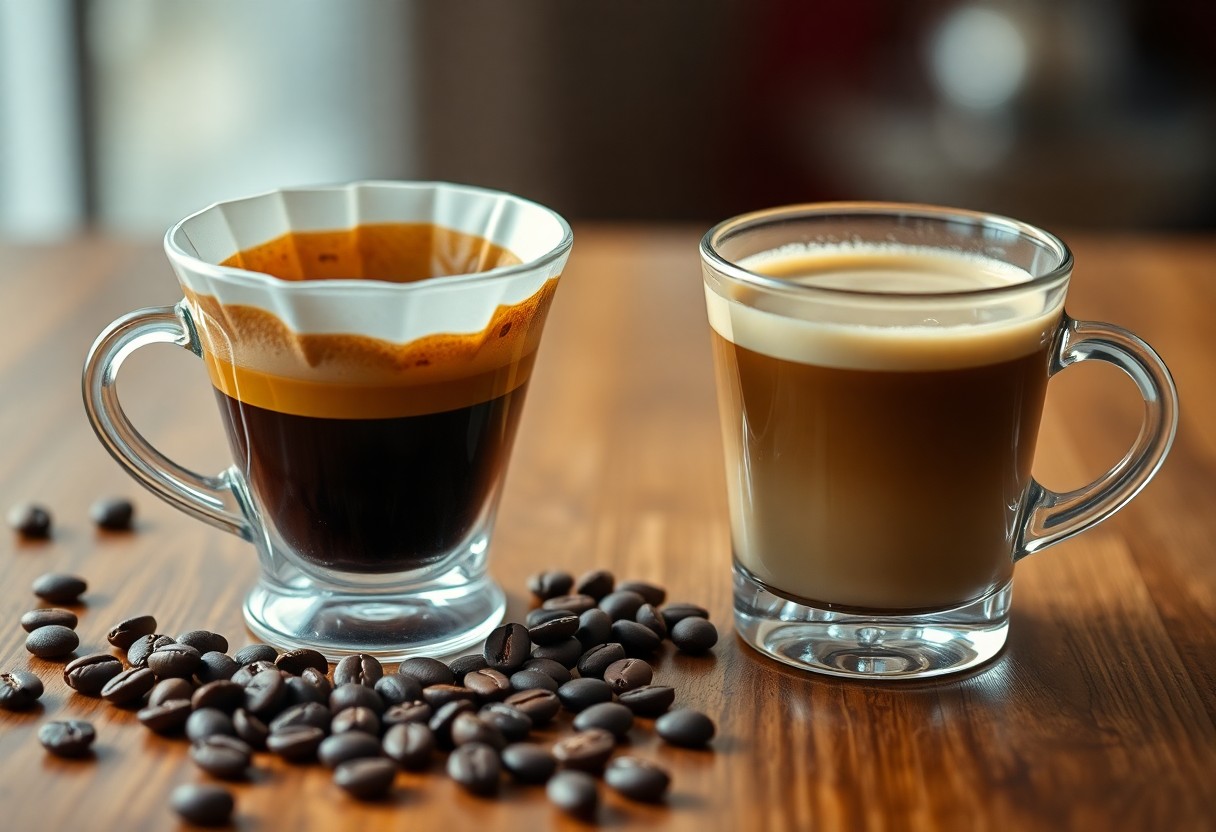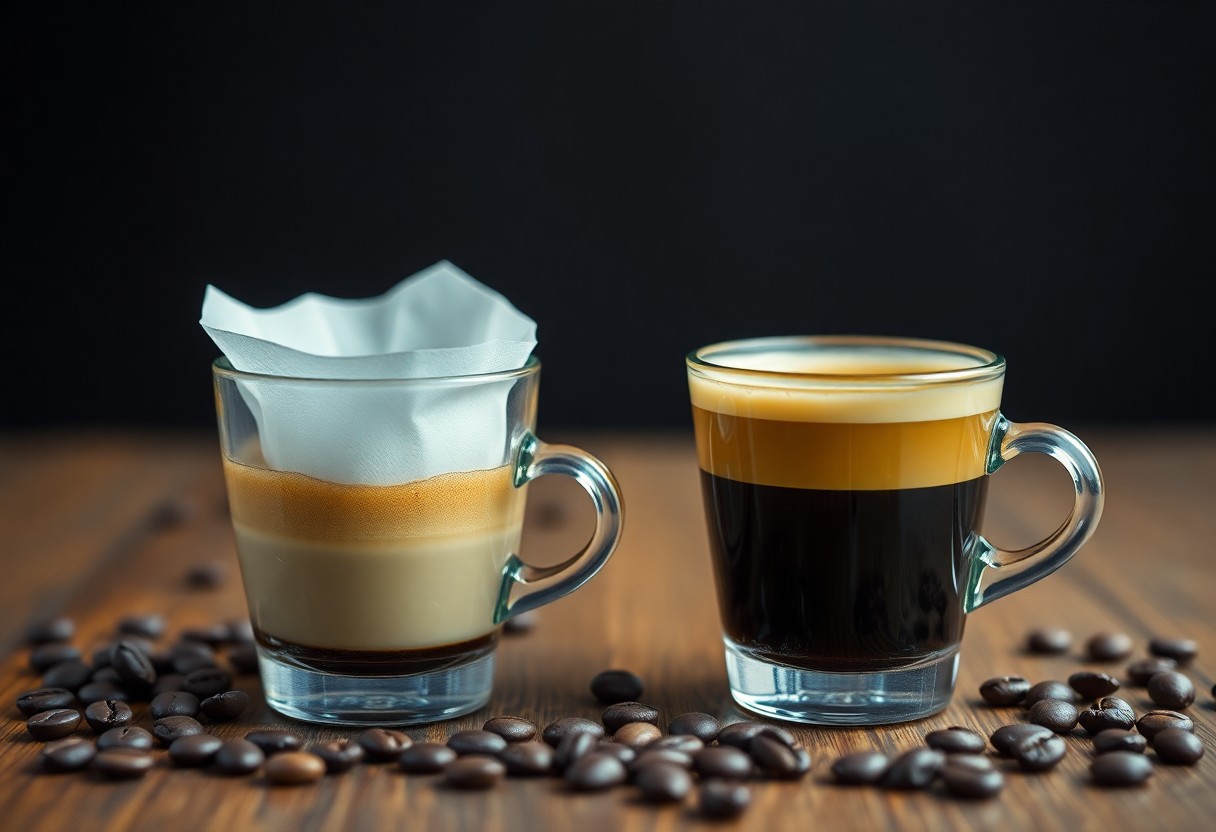Most coffee lovers have their favorites when it comes to brewing methods, yet understanding the differences between filter coffee and regular coffee can enhance your appreciation and enjoyment of your morning brew. In this post, you’ll discover how these two methods differ in flavor, preparation, and health benefits. With insights into their unique characteristics, you’ll be better equipped to choose the right coffee experience for your palate and lifestyle.
Key Takeaways:
- Filter coffee typically uses a drip brewing method that allows water to pass through ground coffee, resulting in a smoother taste and a more aromatic experience compared to regular coffee methods like espresso.
- Regular coffee can encompass various brewing techniques, including espresso and French press, each producing different flavor profiles and strengths depending on the grind size and extraction time.
- Preparation time and equipment vary; filter coffee often requires specialized devices such as coffee makers or pour-over setups, while regular coffee might be brewed using simpler methods like instant coffee or traditional stovetop techniques.

Understanding Coffee Types
Before venturing into specifics, it’s necessary to know the various coffee types available. Here’s a quick comparison to grasp the differences:
| Coffee Type | Description |
|---|---|
| Filter Coffee | A brewed coffee that’s made by pouring hot water over ground coffee. |
| Regular Coffee | Commonly used term for all types of brewed coffee, usually referring to drip coffee. |
| Espresso | A concentrated coffee brewed by forcing hot water through finely-ground coffee. |
| AeroPress | A method of brewing coffee using air pressure and immersion. |
| French Press | A method that steeps coffee grounds before pressing them down with a plunger. |
Perceiving coffee types helps you decide which brewing method suits your taste preferences.
Definition of Filter Coffee
Beside traditional methods, filter coffee is a popular brewing style where hot water is poured over coffee grounds placed in a filter. This method allows for a clean cup, extracting the necessary oils and flavors without the grit, resulting in a smooth and nuanced taste. You’ll appreciate the clarity of flavors when enjoying well-prepared filter coffee.
Definition of Regular Coffee
Definition of regular coffee typically refers to drip coffee, brewed by infusing hot water through coffee grounds contained in a paper or metal filter. It’s the most common coffee preparation method in homes and cafes alike. You can quickly make a cup by using an automatic coffee maker, where water is heated and dripped over the grounds, resulting in a convenient and flavorful beverage.
In addition, the world of regular coffee is vast, embracing various brands, roasts, and brew methods that cater to your preferences. The coffee-to-water ratio impacts flavor intensity, and choosing the right grind size can enhance your brewing experience. While the averages suggest no harmful effects, some regular coffees may contain higher caffeine levels, leading to jitteriness or sleep disturbances if consumed excessively. Always stay mindful of your intake to enjoy your coffee time without adverse effects.
Brewing Techniques
The brewing techniques for filter coffee and regular coffee create distinct flavor profiles and experiences that you will want to explore. Filter coffee, known for its clean taste, relies on specific methods to extract the desired essence from the coffee grounds, while regular coffee often utilizes approaches that maximize strength and robustness, providing a different drinking experience. Understanding these techniques can enhance your appreciation of both types of coffee.
Methods for Filter Coffee
On your journey to brewing filter coffee, you can utilize methods such as pour-over, French press, or automatic drip machines. Each method allows you to control the water temperature and extraction time, resulting in a uniquely aromatic and flavorful cup.
Methods for Regular Coffee
Between filter coffee and regular coffee, you’ll find multiple brewing methods for regular coffee, including espresso machines, stovetop percolators, and single-serve pod systems.
But when selecting regular coffee brewing methods, you should consider the potency and speed of extraction. Espresso machines pressure-brew coffee quickly, yielding a concentrated drink with a rich crema, although they require careful attention to grind size and extraction time. Stovetop percolators, on the other hand, can produce a strong brew but may risk over-extraction if left too long. With single-serve pod systems, you enjoy convenience, though they may lack the depth of flavor found in traditional methods. Each method has its merits, allowing you to tailor your coffee experience to your personal taste preferences.

Flavor Profiles
Many coffee enthusiasts notice a distinct difference in flavor profiles when comparing filter coffee and regular coffee. Filter coffee, often brewed using the drip method, showcases a cleaner, more nuanced taste that allows the unique characteristics of the coffee beans to shine. In contrast, regular coffee, typically prepared using a French press or espresso method, often presents a bolder and richer flavor, emphasizing body and intensity.
Taste Characteristics of Filter Coffee
Around filter coffee, you will find a delicate balance of acidity and sweetness. The brewing method enhances the coffee’s natural flavors, producing a light, aromatic drink that highlights floral and fruity notes. This clarity allows you to appreciate the subtleties in each cup, making it an excellent choice for those who savor sophisticated flavors.
Taste Characteristics of Regular Coffee
Filter coffee differs significantly in flavor profile from regular coffee. Filter coffee tends to emphasize cleaner profiles, while regular coffee emphasizes boldness.
Considering regular coffee, you experience a robust and intense flavor accompanied by a thicker body. This style typically displays a balanced mixture of bitterness coupled with earthy and chocolatey undertones. The use of different brewing methods can further intensify these flavors; for instance, espresso offers you a concentrated and rich shot, perfect for those seeking a quick caffeine fix. Additionally, the variations in bean origin and roast level can lead to a spectrum of flavors, from sweet caramel notes to deep dark chocolate, giving you a profoundly rich coffee experience.
Health Benefits
For coffee lovers, understanding the health benefits of filter coffee compared to regular coffee can be enlightening. Filter coffee is generally known to have lower levels of cafestol, a compound that may raise cholesterol levels. This makes it a safer option for those monitoring heart health. Additionally, both types of coffee contain antioxidants that can protect your cells and promote overall well-being. Ultimately, your choice could influence your health, so consider these factors when selecting your daily brew.
Nutritional Aspects of Filter Coffee
At the heart of filter coffee’s appeal are its nutritional benefits. This brewing method reduces oils that can contribute to elevated cholesterol, providing you with a cleaner cup. The antioxidants found in filter coffee can assist in fighting inflammation and may lower the risk of chronic diseases. Incorporating filter coffee into your routine can support your overall health while delivering the rich flavor you love.
Nutritional Aspects of Regular Coffee
Filter coffee provides a distinct set of advantages compared to regular coffee, particularly when it comes to health considerations.
Due to the brewing method of regular coffee, it often contains higher levels of chlorogenic acid and caffeine, which can offer metabolism-boosting effects. However, it also retains higher amounts of cafestol, which may elevate your cholesterol levels if consumed excessively. While regular coffee can be a rich source of antioxidants and potential health benefits such as reduced risk of certain diseases, it’s crucial to be mindful of your intake to avoid negative outcomes. Balancing your consumption will ensure you reap the positive effects without the associated risks.
Popularity and Consumption
All around the world, both filter coffee and regular coffee have carved out their unique spaces within the hearts and daily routines of coffee lovers. Filter coffee often finds popularity in countries with rich coffee traditions, while regular coffee beverages, such as espresso and cappuccinos, dominate coffee shops globally. Your preference between the two may depend on your lifestyle, taste, and the coffee culture in your area.
Filter Coffee Trends
With the rise of artisanal coffee shops and home brewing techniques, filter coffee is experiencing a renaissance. Many coffee enthusiasts are gravitating towards the slower brewing methods and the ability to craft a personalized cup. You may find that this trend promotes not just a richer flavor but also an engaging ritual around coffee brewing, emphasizing quality over speed.
Regular Coffee Trends
Regular coffee continues to be a staple in many households and cafes, becoming increasingly versatile and creative in its offerings.
The surge in the popularity of ready-to-drink (RTD) coffees has made your morning routine more convenient than ever. In addition to classic brews, you’ll notice an array of cold brews, flavored lattes, and nitro coffee options taking over shelves and menus. This trend reflects your evolving tastes and preferences, as regular coffee adapts to contemporary lifestyles. Moreover, sustainable practices and innovative brewing techniques are also attracting health-conscious consumers who want to enjoy their caffeine fix responsibly. With such diverse choices, regular coffee has solidified its place as a beloved beverage across the globe.
Conclusion
So, as you explore the differences between filter coffee and regular coffee, you’ll find that each method offers a unique flavor profile and brewing experience. Your choice ultimately depends on your personal taste preferences and how you enjoy your coffee ritual. By understanding the brewing techniques, grind sizes, and flavor notes associated with each type, you can elevate your coffee enjoyment and make informed decisions to enhance your daily cup. Dive into the world of coffee, and discover which brew resonates with your taste buds.
FAQ
Q: What is the primary difference between filter coffee and regular coffee?
A: The primary difference lies in the brewing method. Filter coffee is made by pouring hot water over ground coffee and allowing it to pass through a filter, which removes the coffee grounds. Regular coffee often refers to brewed coffee made using various methods, including instant coffee or espresso, which may not use a filter and may involve different processes for extracting flavor and compounds from the coffee beans.
Q: How do the flavor profiles of filter coffee and regular coffee differ?
A: Filter coffee typically has a smoother and cleaner taste due to the filtration process that removes most oils and sediments. This method accentuates the coffee’s natural flavors and acidity. In contrast, regular coffee, especially if brewed using an espresso machine or French press, can be bolder and richer, often retaining more oils and heavier elements from the coffee grounds.
Q: Are there differences in preparation time between filter coffee and regular coffee?
A: Yes, preparation time can vary. Filter coffee generally takes a bit longer to brew, as the water slowly drips through the coffee grounds and filter. This process can take anywhere from 4 to 10 minutes, depending on the setup. Regular coffee methods, such as using an espresso machine, can be much quicker, with brewing times typically under a minute, allowing for a faster coffee experience, especially in a busy setting.
Q: Is there a difference in caffeine content between filter coffee and regular coffee?
A: The caffeine content can vary based on the brewing method and type of coffee bean used. However, filter coffee often contains more caffeine per serving compared to regular drip coffee made without a filter, as the brewing duration and water contact time can result in higher extraction of caffeine. It’s also noted that espresso, a type of regular coffee, has less caffeine per ounce but is served in much smaller amounts, making direct comparisons a bit nuanced.
Q: Can I use the same beans for filter coffee and regular coffee?
A: Yes, you can use the same coffee beans for both filter coffee and regular coffee, but the grind size will vary depending on the brewing method. For filter coffee, a medium to medium-coarse grind is typically preferred, while regular coffee brewed using methods like espresso requires a finer grind. Each grind size affects extraction and flavor, so using the appropriate grind size for your brewing method is important to achieve the best results.